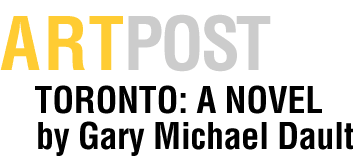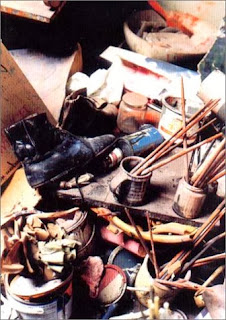“Who gathers the most
dust?” he asked her, grinning.
“Heidegger? John Stuart
Mill? Derrida?”
“It’s pretty evenly
distributed,” she told him.
“That’s too bad,”
said Michael, taking another sip of tea, “I was sort of hoping old Heidegger
would be the front-runner, dust-wise!”
“Dust-wise?”
“A rolling
philosopher gathers no dust,” he assured her.
“What on earth do you
mean?” May asked him.
“Oh nothing, really.
I’m just talking silly to justify my sitting here and gazing at you.”
May put down the
feather duster and gave him a kiss on the forehead.
“Don’t you have anything
more pressing to do?”
“I do, but I’m
putting it off for as long as possible.
I sort of half-promised a painter I know that I’d go see his work. A guy named Homer Rubik.”
“That’s an odd name,”
said May, moving from the philosophy section to the history section.
“Well, he’s an odd guy,” said Michael, “and his name suits him
nicely. ‘Homer’ may be a bit lofty
for him, but “Rubik’ is perfect—like the infamous cube, he’s shifty, lots of
sides, lots of angles, ultimately unknowable, and, in the end, probably
pointless.”
“Why do you care
about him then?”
“I don’t,
really. But the stuff he makes is
extraordinary—in a sort of unhealthy, unwholesome way.”
“What’s it like?”
“Very strange. It’s like Old Master painting, but small—on
scrap pieces of paper. He paints
on anything—envelopes, butcher paper, newspapers, pages torn from magazines,
flattened-out cardboard boxes….
He’s like a back-alley Raphael or Caravaggio!”
“So you’re going to
visit his studio?”
“Well, he doesn’t
really have a studio.
The guy is a short-order cook in a diner.
I’m told he lives in a two room apartment and apparently paints in his
kitchen.”
“Maybe he’s a
genius!”
“Yeh maybe.”
“But probably not?”
“No, probably not.”
“And now you’ll see for yourself.”
“Yeh. Lucky me.
It took Michael some time, but he finally found
what he took to be Homer’s little flat—high atop the rusty fire-escape at the
back of a five-story building on Stafford Street, south of Trinity Bellwoods
Park. He was standing at the foot
of the stairs when he suddenly spied Bliss Carmen, leaning over the railing outside
Homer’s door. Fish was with her,
of course, and took this opportunity to undertake a feat of aerial bladder
evacuation, cocking his left back leg against one of the steel railings of the
fire escape and pissing a yellow rain that fell perilously close to Michael.
“Missed you!!” cried Bliss happily.
“Yeh,” said
Michael. “The happy intervention
of a sudden breeze from the west.”
“C’mon up!” boomed Bliss.
Michael climbed the
fire escape, feeling more certain with every step that this whole visit was a
mistake.
Bliss led him into
the first of Homer’s dank rooms. It seemed to be some kind of sitting room, though
there really wasn’t anyplace to sit.
There was a greasy mattress on the floor.
“That’s where we
sleep,” Bliss announced. “This is
our boudoir.”
Michael suppressed a
shudder. A shudder not so much
engendered by the ad hoc bed as by the whole idea of sleeping with Bliss. Geez, thought Michael to himself, did any woman ever bear such an inappropriate
name!
He heard Homer
stirring in the second room.
“Homer,” boomed
Bliss, “get out here!
My big Writer Friend is here!”
“You mean Zorba?”
muttered Homer.
Michael felt like
strangling them both.
“Yeh, he might write
something about your work!”
“Listen, I never said
I…” Michael began when Bliss shushed him.
“Don’t be like that,”
she told him in a loud whisper. “Homer needs encouragement.”
Homer finally appeared
in the doorway, naked to the waste, his jeans stiff with what Michael supposed
might equally be dried oil paint or congealed egg.
“You come to see my
stuff?”
“Yes,” Michael, told
him. “You have some things here?”
“I’ve been doing
stuff,” said Homer.
“Home’s very
prolific!” boomed Bliss. “He always has work around!”
“Okay,” said
Michael. “Let’s look through some
things.”
Home returned to the
second room—the kitchen he used to paint in—and beckoned Michael to follow.
“I would have thought
you’d have had enough
of kitchens!” said Michael, trying for a preliminary pleasantry.
“What?” said Homer.
“Michael means that
you just seem to go from one kitchen to another!”
she said heartily. “That’s what
you meant, wasn’t it, Michael?”
Michael smiled
weakly.
“Fish, stop that!!” yelled Bliss suddenly. Fish had lifted his leg and peed
copiously on a pile of ink drawings.
The ink had now begun to run and was pooling on the floor.
“Ha!” laughed Bliss,
“a new medium!”
Homer gave Fish a
kick.
“Andy Warhol did a
series of piss paintings once,” said Michael. “They were on metal.
He called them his ‘Oxidation paintings’ because the urine changed into
beautiful colours when it dried on the metal backing!”
“Who?” asked Homer.
“Andy Warhol,” said Bliss, speaking loudly and
distinctly to him as if she were speaking to someone with hearing problems.
“So what?” said
Homer.
Michael couldn’t
think of a good answer.
“




